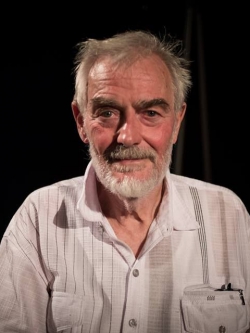Foreigners Pt. 1
In a broad sense, Nestler has worked with several types of documentary film: interview films, photo collages and direct cinema. The two-part Utlänninger is a flow of free-association, a series of notes with self-commentary, and an essay film.
Nestler’s films have examined all kinds of crafts, including early industrial and fine arts, but this film focuses on the past and present of shipbuilding and weapon production. Here he arrives at the foundation of any empire: the guest workers, whom local citizens received with hatred, brought from distant lands by the thousands to build ships and weapons for the empire. Nestler works to replace Renaissance battle scenes with images of modern factories and workers’ demonstrations.
In 1976, eight years before the paradigmatic theory of intertwining warfare, commerce, and representation appeared in Paul Virilio's Guerre et Cinéma, Nestler led us through the economic and political history of Gotland and Sweden through Roman drawings, Viking engravings, and Renaissance paintings. This film is the antecedent of Mitt land/Mi país and Zeit, and marks the first time Nestler based an entire film on traces from other art forms.
Children, perhaps the orphans of the centuries, appear as Nestler wanders through dormant battlefields. This is one of the most haunting and inexplicable moments of his direct, didactic oeuvre, and keenly reflects his general aspiration to make children's history an equal aspect of our common history.
Peter Nestler (b.1937) is one of the most singular and important filmmakers to emerge in postwar Germany. In the early 1960s Nestler made a series of poetic films about the changing realities in rural and industrial areas and about the working class communities, mostly in Germany, but also in the UK, where he filmed A Working Men's Club in Sheffield (1965). In the same year he directed From Greece (1965), on the rise of and struggle against fascism followed by the unsparing and exigent In the Ruhr Area (1967). Opposition to his political views and film aesthetics led Nestler to Sweden, where he worked mostly for television. Since the 1970s, Nestler has directed an extraordinary body of work further expanding the form and themes of his first films, including history, the working class, anti-fascism, the history of labour and production, and immigration. In the past 20 years, Nestler's films have continued to focus on change, remembrance and preservation, as exemplified by The North Calotte (1991), a remarkable travelogue tracing the harmful effects of industrialisation on the Sami communities and the landscape of Northern Europe.
(Source: https://dafilms.com/)


